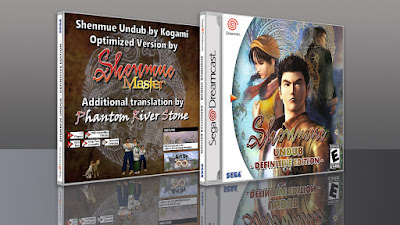 |
| Source: Shenmue Forever/Phantom River Stone |
One of the most memorable aspects of the original Shenmue - for me at least - was the voice acting. When I say 'original,' naturally I mean the PAL version, y'know living in the UK and all. That disconnect between 1980s Japan and Ryo speaking with a slightly disjointed American accent; and the ensemble cast of weird, over-acted, oddball voices that assaulted the ears whenever you dared interrupt some NPC while they wandered aimlessly through Dobuita before vanishing into thin air outside Tom's hot dog van. That's peak nostalgia right there, kids.
It's apparent that not everyone shares my fondness for this audio aesthetic though, as a number of fan projects over the years have attempted to 'undub' the Western version of Shenmue, replacing Corey Marshall's dulcet tones with the original audio from the NTSC-J release of Shenmue. The latest attempt at this, according to the fine folks over at Shenmue mega-site Phantom River Stone is the definitive edition of these undub efforts, and have now presented to the world the fittingly monikered Shenmue Undub: Definitive Edition.
 |
| Source: Phantom River Stone |
Before I continue, you really should check out Phantom River Stone in general if you're a Shenmue fan, as along with resources like Shenmue Dojo and Adam Koralik's YouTube channel, it really is a marvellous repository of Shenmue trivia and random musings. But back to Shenmue Undub: Definitive Edition. Created in collaboration with Shenmue Master, Shenmue Undub: Definitive Edition is reckoned to be the ultimate restoration of the Dreamcast title, with original Japanese voice overs, English subtitles and even minor bug fixes and restored original textures. Here's a rundown from Phantom River Stone:
- Based on the Kogami Undub: this version builds upon the most complete fan-made Undub version, which was created by Kogami and runs on the Dreamcast.
- Full English subtitles: the official translated lines are used where available. A small number of the Japanese spoken lines (around 3%) which did not have English equivalent translations available have been translated by hand. A few small corrections were also made to fix specific lines that had incorrect grammar or meaning.
- Full Japanese audio with no down-sampling.
- PAL-compatible save files: saves can be carried over to the PAL version of Shenmue II.
- CDDA audio tracks included: recorded audio tracks play as expected during the game (e.g. the music that plays when Ryo rides home from the harbor with Nozomi on the back of his motorcycle).
- Coca Cola branding: the branding for the vending machines and soda cans in the game shows the Coca Cola branding, as seen in the Japanese version of Shenmue..
- Fixes for small glitches identified in the previous Undub version (e.g. conversations when Ryo knocked on house doors did not play out properly).
- Fits on standard CD-R discs: the images have been stream-lined to allow them to be played on a Dreamcast console using standard CD-R discs, with no missing or cut content.
 |
| Source: Phantom River Stone |







